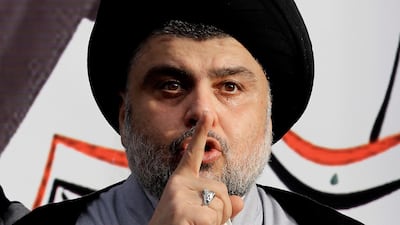A statement by the US embassy in Baghdad that accused Iran's supreme leader Ayatollah Ali Khamenei of corruption has caused anger and alarm among Iraqi officials.
Baghdad is caught between arch-enemies Washington and Tehran and is walking a fine line to maintain good relations with both.
“Corruption is rife in all parts of the Iranian regime, starting at the top,” the US embassy in Baghdad said in a post on its Facebook page on April 25.
“The possessions of the current supreme leader Ali Khamenei alone are estimated at $200 billion, while many people languish in poverty because of the dire economic situation in Iran after 40 years of rule by the mullahs.”
Iraq’s foreign ministry urged the embassy to remove the post and refrain from actions that harm the country's relations with its neighbours. “The embassy’s statement contradicts the nature of its work in the host country and Iraq’s constitution and foreign policy,” it said.
The ministry stressed that Iraq would not “be used as a corridor or a platform to harm neighbouring states through security, media or economic means”.
Since the US led-invasion in 2003, Iraqi politics has been dominated by efforts to balance relations between the two bitter enemies.
Various Iraqi officials have voiced their concerns about the statement.
Iran-backed militia leader and politician Hadi Al Ameri condemned “the use of diplomatic missions in Iraq to harm any country or religious authorities”.
He said the statement was a violation of diplomatic regulations and norms.
Populist cleric Moqtada Al Sadr called for the closure of the embassy in Baghdad.
Mr Al Sadr warned that if Iraq was dragged into the conflict between Iran and the US, then the embassy would come “under attack by resistance fighters”.
"Iraq is caught between two conflicting parties, Iran and the coalition led by [US President] Donald Trump and [Israeli Prime Minister] Benjamin Netanyahu," the cleric said.
Shiite cleric Ammar Al Hakim warned against "insulting" statements that could destablise the country.
“We reject any insult by anyone or any government against religious leaders,” Mr Al Hakim wrote on Twitter.
The cleric underlined Iraq's "neutrality and non-interference" in regional conflicts.
Last month, Iraqi President Barham Salih vowed that the country would not be used as a military base for foreign states to attack each other.
Instead, Iraq should serve as a leading peacemaker in a troubled world, Mr Salih said during the annual Sulaimani Forum.
“We don’t want to be part of these conflicts," he said. "Iraq is still not a very stable country, and putting an extra political burden on it is unacceptable.”


